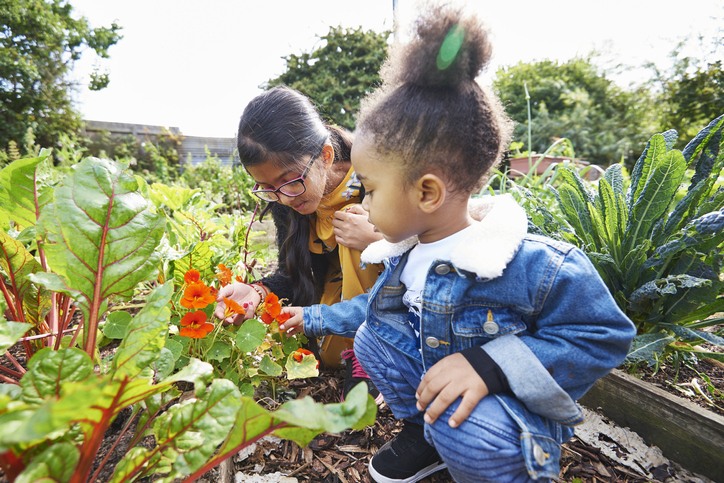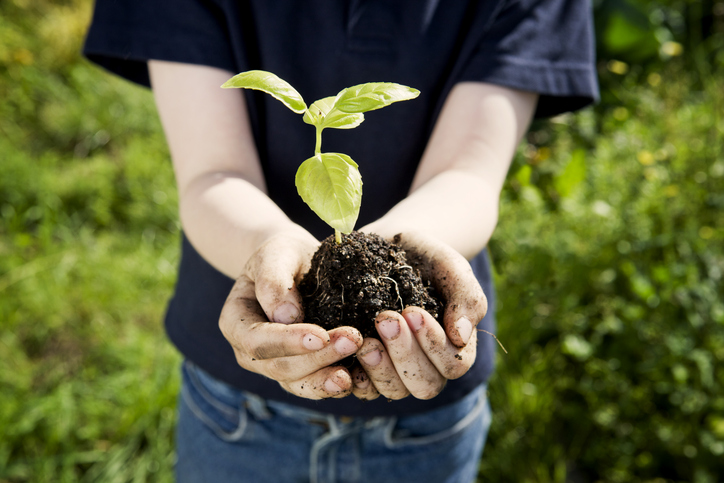Why Gardening In Schools May Be One Of The Best Lessons For Children

By Joy Stephenson-Laws, JD, Founder
I really do believe that children learn some of their best lessons outside the classroom. Of course, like millions of other people, my hope is that kids all around the world can safely get back in the classroom. But during times such as these, it may help to look outside - literally.
Our health is really our greatest wealth, but we have to be proactive to maintain our health. One way to be proactive about our health is to have our children learn very early on in their lives what they can do to be healthy. And a recent study provides some evidence which suggests that there is a connection between school gardens and children eating more vegetables. Getting kids outside and explaining to them why it’s so important to regularly eat natural, nutrient-dense foods that grow right out of the ground is an invaluable lesson that may serve them for a lifetime.
Studies show that if kids eat healthily, the more likely they will continue these healthy eating habits into adulthood. There is certainly a childhood obesity epidemic in America which is usually associated with consuming excessive amounts of processed foods. This is very disturbing. Children who suffer from excessive weight issues are more likely to be overweight as adults. This can increase their risk of developing serious health issues such as diabetes, hypertension, heart disease, depression, cancer and more.

Lessons in nutrition and cooking.
Researchers of the study focused on 16 elementary schools across Central Texas. They worked with these schools to build vegetable gardens and “teach classes to students and parents about nutrition and cooking,” according to this Medical Xpress report discussing the study.
The researchers intentionally selected schools where there were children who came from low-income families and communities and did not necessarily have access to healthy foods such as fresh produce.
“The study found that students who participated in the gardening, nutrition and cooking classes ate, on average, a half serving more vegetables per day than they did before the program,” reports Medical Xpress.
“Although a half serving increase in vegetable consumption per day may seem like a small change, it's extremely encouraging…”
I would agree. It may seem very daunting to get your kids to eat more vegetables, but small changes can lead to big results by having a snowball effect.
“Previous studies have shown that increased fruit and vegetable consumption can promote health and lower the risk of developing cardiovascular disease, type 2 diabetes and some cancers.”
If your child’s school does not have a vegetable garden, work with other parents who have children enrolled at the same school to advocate for one. You can also have your own vegetable garden at home if you have the space. There are also ways to create indoor gardens.
And if you are not quite ready to jump on the gardening bandwagon at home, be sure to take advantage of your local farmers’ markets. They’re great for getting outside and changing up the sometimes mundane trip to the grocery store. It’s also great to support local businesses that offer fresh, healthy foods. It can also be beneficial to bring your child to a farmers’ market. Seeing the array of colorful, fresh produce and learning about where these foods come from can be empowering for children. Instead of seeing fruits and vegetables as foods they have to eat, they may see them as foods they want to eat. The tasty, free food samples also add to the fun.
Out with the bad...the processed.There are significant health advantages to replacing processed and ultra-processed foods with healthy, nutrient-rich fruits and veggies. And what better way to empower our children to be proactive and healthy than by showing them how to grow their own healthy food.
And remember, one secret to getting kids to eat more vegetables may be introducing them to herbs and spices. It is also good to meal prep at home with your kids and set the example as the adult.
Finally it is important to make sure that our kids are nutritionally balanced. Have your child take routine comprehensive nutrient tests. If the test reveals your child has too much or too little of a certain nutrient, a competent healthcare professional can help with making the necessary dietary changes or recommend quality supplements if necessary.
Enjoy your healthy life!
Disclaimer: This article is not intended to provide medical advice. Please consult with your doctor or another competent healthcare practitioner to get specific medical advice for your situation.
The pH professional health care team includes recognized experts from a variety of health care and related disciplines, including physicians, attorneys, nutritionists, nurses and certified fitness instructors. This team also includes the members of the pH Medical Advisory Board, which constantly monitors all pH programs, products and services. To learn more about the pH Medical Advisory Board, click here.







